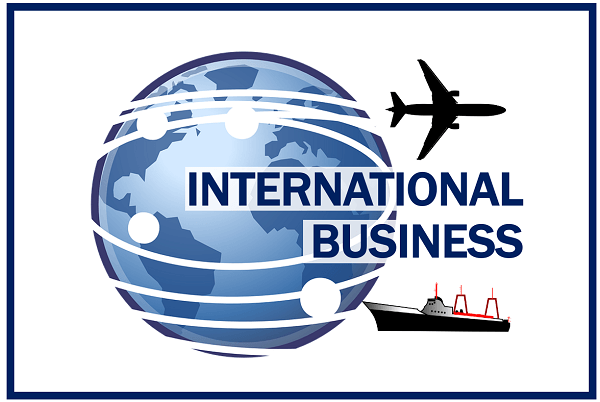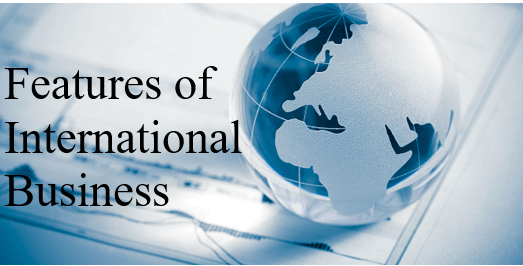International Business DefinitionCommercial activities that cross national borders are referred to as an international business. As a result, it covers not only the transnational flow of products and services but also the movement of money, people, and other types of intellectual property, including patents, trademarks, technical knowledge, and copyrights. 
It is a trade that occurs between two nations beyond international borders. This covers the transfer of money, people, technology, and intellectual property rights, including patents, trademarks, and know-how, as well as the international movement of commodities and services. Anything bought or sold outside of a country's borders is referred to as international trade. Types of International Business
1. Import and Export
This is frequently due to the fact that imports and exports are the most fundamental and significant international commercial activity, as well as the simplest and least expensive way for a firm to join a market when opting to develop internationally. The first option is this. 2. LicenseOne more strategy for expanding your company globally is through licensing. A license is an agreement between two businesses that grant one business, known as the licensor, the right to use another business's intellectual property, such as brand names, copyrights, patents, technology, and trademarks, for a specific length of time or certain moments in terms of loyalty, licensees profit. The corporation might decide to sell the items under license if the production expenses in the nation are too expensive, there are stringent governmental rules, or the company wishes to sell and make standardized products worldwide. 3. FranchiseLicensing and franchises go hand in hand. A parent firm (the franchisor) grants permission to other businesses (the franchisees) to do business using the franchisor's brand and products in a predetermined manner. Franchisees are required to abide by far tougher rules than licensees do. Additionally, licenses are for manufacturers, whereas franchises are more common in hotels, rental businesses, and dining establishments. 4. Strategic Partnerships and Joint VenturesStrategic partnerships or alliances are a healthy development when two or more businesses from different nations work together for their mutual advantage. A unique kind of strategic alliance called a joint venture brings together partners from different parts of the world to build a business that produces goods and services. We may split the cost of manufacturing, technology, development, and distribution networks through corporate collaboration. The corporation is in an advantageous position for both parties as a result of the pooling of resources for mutual gain. For instance, Motorola and Toshiba collaborate strategically to create a manufacturing method for microprocessors. 5. Foreign Direct Investment (FDI)Companies that engage in FDI get access to lower labor costs, tax benefits, and other advantages abroad. Introducing new goods, services, technology, and managerial abilities will benefit the host nation. Additionally, FDI aids in advancing changes in the host nation's domestic politics and enhancing economic circumstances. For instance, the US-based corporation Intel has FDI in several Southeast Asian nations. Features of International Business
1. Large Scale OperationsIn international business, every operation is carried out on an enormous scale. Activities related to production and marketing are carried out on a huge scale. It starts off by hawking its wares around the local area. After that, the excess goods are exported. 2. Integration of EconomiesThe economies of numerous nations are combined via international trade. This is due to the fact that it employs infrastructure, labor, and financing from other nations. It creates the product in one nation, manufactures the product's component components in several nations, and assembles the product in a separate nation. In other words, it offers the goods on the global market in numerous nations. 3. Dominated By Developed Nations and MNCsMultinational companies (MNCs) from developed nations dominate international trade. MNCs from the USA, Europe, and Japan currently dominate (completely control) international commerce. This is a result of their substantial financial and other resources. Additionally, they have the most advanced technology and R & D. They have highly talented managers and staff because they pay extremely high wages and provide other advantages. They provide affordable goods and services of high quality as a result. This enables them to seize and control the global market. 4. Advantages for Participating NationsAll nations that participate in international trade get advantages. But developed (wealthy) nations benefit the most. Additionally, the poorer emerging nations profit. They obtain foreign money and technology. Industrial growth occurs quickly there. More job options are available to them. The emerging nations' economies are able to grow as a result of everything. As a result, via the use of liberal economic policies, emerging nations open up their economies. 5. Competitive EnvironmentA global market is a place where international companies must contend with intense (too intense) rivalry. Developed and emerging nations are unfairly competing against one another. Due to their ability to manufacture high-quality goods and services at extremely cheap costs, developed countries, and their MNCs have an advantage in this fierce rivalry. The global market is well-connected to developed nations as well. Therefore, competing with rich countries is extremely tough for emerging countries. 6. Special Role of Science and TechnologyScience and technology are highly valued in international commerce. S&T (science and technology) aids in the business's ability to produce on a wide scale. High-tech equipment is used in developed nations. As a result, they control international trade. They are able to convey such cutting-edge technologies to underdeveloped nations because of international trade. 7. International LimitationsThere are several limitations to the influx and outflow of cash, technology, and commodities for international enterprises. Many nations forbid foreign corporations from operating there. They have several trade barriers, tariffs, limits on foreign exchange, etc. All of this is detrimental to global trade. 8. Sensitive NatureThe nature of the global market is particularly delicate. Any modifications to the political climate, technological advancements, or economic policies have a significant influence. As a result, multinational businesses must conduct marketing research to learn about and analyze these developments. To adapt and endure changes, they must modify their company operations. ExamplesFor a better understanding of international business, consider the examples below: Example 1The core of Apple's business strategy is to enhance an existing product while integrating it into a sizable ecosystem of programs and services. They innovated their devices' OS platform, look, and companion apps. For instance, Apple did not design the tablet. In actuality, the business started experimenting with several tablets in 1989, when GRiDPad was in use. However, Apple did make improvements to them, which led to the creation of a billion-dollar tablet market. 
Businesses must continually innovate to be competitive, attract customers, and keep their existing clientele. The global marketplace is difficult. At come at findings that benefit enterprises, technology, and research approaches are applied. Apple, for instance, spent $18.7 billion on R&D in 2020 while still holding over $200 billion in cash. This information demonstrates how fiercely competitive the market is and how difficult it is for enterprises to succeed. Example 2In 1940, Richard and Maurice McDonald built a restaurant in California that would eventually serve as the nucleus of the McDonald's Corporation. It is a global fast-food chain with American roots. Numerous factors contribute to the success of the biggest fast food chains. 
On the other hand, McDonald's profits from the trend of globalization as a global economic juggernaut that exported the American way of life to numerous countries worldwide. In order to adjust to the social landscape of each nation, McDonald's simultaneously employed local franchisees. This is an illustration of a worldwide company strategy. Scope of International BusinessCompared to domestic business, international business has a broader range of activities since it encompasses the following: 1. Imports and Exports of MerchandiseWhen we talk about merchandise, we mean tangible goods like clothes and furniture that can be touched and seen. Therefore, the transfer or exchange of physical items between nations is what is meant by the terms "imports" and "exports" of trade. Considering that it doesn't involve the purchase or sale of services, it is also known as a trade in the product. 2. Imports and Exports of ServicesServices are intangible items that cannot be seen, felt, or touched. As invisible trade, it is also known as. Imported and exported services include those related to travel, tourism, and other areas of transportation and communication. 3. Licensing and FranchisingA license is a contract between two businesses that allows the licensor (one business) to provide the licensee (another business) access to trademarks, copyrights, patents, etc., in another nation in exchange for a fee. Royalty is the name for the cost imposed by the licensor. Microsoft, for instance, provides licenses to other businesses in exchange for royalties. Licensing and franchising are related. But rather than giving users access to patents and other intellectual property, it offers services. One franchise that offers the same services to clients is Subway, which has locations all over the world. 4. Foreign InvestmentThis is when you put money into a foreign nation in hopes of making a profit. Direct and portfolio investments from abroad are possible. A company makes a direct investment when it purchases equipment and facilities in another nation in order to produce and sell goods and services there. A portfolio investment is a foreign investment when a corporation loans money to another company or buys shares of another company in a different nation. Dividends or interest are the two ways that the return on a portfolio investment is obtained. Factors Affecting International Business
1. CultureDue to the diversity of cultures, businesses must educate themselves on different cultures prior to conducting business overseas. The right appraisal of cultural preferences, traditions, and conventions can lead to better judgments. Numerous businesses have realized that culture is shifting and have adapted their offerings accordingly. For instance, in India, McDonald's sells veggie burgers rather than meat burgers. 2. Economic SystemBusinesses should be familiar with the different economic systems that are in use in the nations they are thinking about doing business with. The degree to which a state owns a corporation and how much it intervenes in that company is reflected in the nation's economic system. Many businesses often choose nations with little government interference. The majority of government laws on corporate ownership fall into one of three categories: capitalist, communist, or socialist. However, each government has its unique set of regulations. 3. The Economy SituationBusinesses must foresee the economic situation of a foreign nation in order to predict the demand for their products there. Depending on how sensitive a firm is to international economic development and the environment in which that country operates, that company's overall success will vary. 4. Exchange RatesMost nations have their own money. Dollars ($), British pounds ($), Canadian dollars ($), Japanese yen ($), and dollars ($) are the four different currencies used in the world. The euro (?), a recently introduced currency, is used in 12 nations across Europe. The value of the US dollar varies throughout time in relation to other currencies. As a result, even if a foreign firm's actual price for the supply remains the same, the amount that a US corporation must pay to obtain it may alter. 6. Political Risks and RegulationsBefore choosing to conduct business in a nation, businesses must take into account the political dangers and regulatory environment present there. The possibility that the political actions of a nation might negatively impact a firm is known as political risk. Eastern Europe, Latin America, and the Middle East are all experiencing political difficulties at the moment. The foreign governments where businesses operate have the authority to enforce policies. Advantages and Disadvantages of International Business
AdvantagesThe many benefits of doing business internationally might help you understand how important it is. The following is a list of them: 1. Foreign Exchange EarningsBeyond the borders of various locations, trade in commodities and services takes place, and profit can be gained because of variations in currency values. As a result, the company becomes more lucrative, and the economy of its home nation is strengthened. As a result, an entry's currency often increases in value when its economy is thriving or when there is a great demand for its goods. 2. Optimal Resource UtilizationResource use is maximized through global commerce and business. This is due to the massive scale at which products for the global market are produced. In international trade, resources are exploited from all over the world. It makes use of global technology and financial resources. 3. Achieve its GoalsTrade and business across borders often succeed in achieving their objectives. Making substantial earnings is a global company's main objective. This is easily attainable since it utilizes the most cutting-edge technologies. In addition, it produces high-quality products. All across the world, these goods are for sale. The company makes significant profits as a result of everything. 4. Distributing Business RisksA gain in one country may more than make up for a loss in another. Furthermore, surplus commodities from one country may be exported to another. Whatever remains after production can be sent to several nations. Everything mentioned here helps to reduce business risks. 5. Effectiveness of OrganizationAs a result of the industry's excellent structure, increasing organizational effectiveness is crucial. It will be easier for them to compete efficiently in the global market. Thus this guarantees it. For this reason, they use all applicable international company management techniques to boost their efficiency. Furthermore, they only employ managers and personnel with the highest levels of training and experience. The personnel in question get regular training. They are also highly motivated due to their extremely high salaries and other benefits, like promotions, abroad assignments, and other advantages. As a result, low costs and significant benefits result from great organizational performance. 6. Advantages for the GovernmentCross-border account settlement is made feasible by foreign exchange. The dynamics of international finance can significantly impact a nation's economy and the performance of particular firms. A country's balance of payments is a record of its trade activities with the rest of the world. It displays whether a country has a trade surplus (where exports have a greater value than imports) or a trade deficit (where imports have a greater value than exports). The economy of the country benefits greatly from the foreign exchange produced by international commerce. The government responds by providing the same range of benefits, services, concessions, and tax advantages. 7. Increasing Business Operations DiversityBecause of the strong profits and government support, expanding and diversifying corporate operations with foreign commerce is easy. 8. Boost Ability to CompeteIt spends a lot of money on advertising across the world. We use cutting-edge technological, managerial, and marketing strategies. All of this will increase the competition, but it will also give it more strength. DisadvantagesThese are the drawbacks of conducting business internationally. 1. Negative Economic ImpactThrough international trade, one nation can adversely affect the economy of another. Additionally, extensive exports impede the industrial growth of importing nations. The economy of the nations that import suffer as a result. 2. Competitors with Established NationsDeveloping nations cannot rival developed nations. The progress and development of emerging nations are hampered by the foreign business if it is not properly handled. 3. Competition Between CountriesCompetition among nations may be sparked by ferocious competition as well as the desire to sell more goods. As a result, maintaining world peace may be difficult. 4. ColonizationImporting nations may become colonized as a result of political and economic shackles and a downturn in their industries. 5. ExploitationInternational trade causes poor nations to be exploited by wealthier nations. Powerful, prosperous nations govern the economics of less developed countries. 6. Legal ConcernsThe various laws, rules, and customs processes that various nations follow immediately influence import and export commerce. 7. Unwanted Fashion PromotionCultural values and traditions differ from one country to the next. There are several elements that could not be compatible with our surroundings, culture, customs, etc. In the guise of cultural exchange, this vulgarity is frequently produced. 8. Language BarriersEstablishing commercial partnerships between nations is difficult because of the many languages spoken in those nations. 9. Dumping PolicyDeveloped nations frequently provide their goods to poor nations for less than what it costs to produce them. As a result, factories in emerging nations have been shut down. 10. Difficult Technical StepsThe procedures in international commerce are quite complex. There are several applications for important papers. At certain stages, sophisticated operations require the assistance of experts. Reasons for Entering International Business
1. Increased ProductivityA company must increase productivity if it wants to survive in the long run. This alone can encourage a business to boost output. An increase in output makes it easier for a business to look for export markets. When new goods need substantial expenditures and extended periods of development time, there is considerable pressure on global markets. Since no one national market is likely to be large enough to support investments of this level, the cost of research and development must be recovered in the global market. 2. Increase SalesA wider consumer base will be attracted by business development on a worldwide scale, which will boost overall revenue sales and lower operating expenses. A further benefit of technology and the internet's revolution is that it has made doing business internationally much more appealing for smaller companies. They are able to lower expenses and boost operational and company management effectiveness since they have the option to outsource. 3. Greater Economies of SaleSome businesses may want to increase their product offerings since they have a better chance of being accepted globally. Businesses may profit from international growth by gaining superior economies of scale in a variety of sectors. A greater production volume results in a decreasing cost per unit of the products. As a result, the product may be produced at a lower cost than previously and sold for a fair price. Additionally, internationalization may present a chance to stand out or capitalize on a new service, brand, or product expansion. 4. Improving ProfitabilityOne of the most frequent justifications for conducting business internationally is to increase profit margins. The next step is frequently to pursue foreign expansion after domestic growth measures have run their course. The client base grows as more nations distribute the merchandise. Due to increased customer loyalty throughout foreign marketplaces, revenue also grows and strengthens. 5. Government Policies and RegulationsManufacturers are drawn to internationalize due to government laws and restrictions. The governments of several nations, including India, provide incentives and other helpful support to domestic businesses to expand internationally. For instance, the Indian government offers a number of benefits to businesses that export to and manufacture in other nations. The Indian government has provided several incentives to entice foreign investment since the economic reforms were introduced in 1991. Companies may occasionally be required to generate foreign currency, as was the situation in India, to fund their imports and other foreign currency obligations, such as the payment of royalties, dividends, etc. Additionally, businesses were permitted to operate in particular industries in India, subject to specific export restrictions. Because of environmental rules and other legislation, several businesses relocate abroad. Companies may relocate to other nations as a result of government laws that restrict the potential for business in the native market. 6. Growth of the Market OverseasNumerous organizations are expanding their markets internationally due to the vast development potential of numerous international markets. Market prospects brought forth by the economic progress of many emerging nations are a primary driver of worldwide corporate expansion. Both the population and the income are rapidly expanding in a number of emerging nations. India has an excellent growth rate, and economic reforms have increased. Additionally, as a result of foreign businesses entering local markets, there is less opposition now than there may have been in the absence of economic expansion. It is practical for a foreign corporation to enter a domestic market without undermining local businesses. Even if there isn't a huge market for some products in these nations right now, many businesses are keen to get a foothold there because of the potential for growth. 7. Diversification to Reduce RisksA firm's total activity may see less jarring variations if its export operation is diverse. A growth in sales in other areas may more than make up for a decline in sales in one market. Even the provision of outlets for surplus production capacity on foreign markets reduces swings. Many nations' business policies or strategic management fundamentally include their economies' systematic and increasing internationalization. The desire to expand and the requirement to preserve competitiveness serve as the driving forces for internationalization. The need to diversify and take advantage of strategic industrialization benefits. For instance, many Indian pharmaceutical companies have come to recognize that their possibilities for expansion in international markets are extremely strong. A few businesses actually operate on a worldwide scale. Their policies were developed with the idea of a single global market in mind. ConclusionIt is important to take care while setting up a foreign operation in a new nation. Companies that want to invest in other countries must analyze the capital development and economic, political, cultural, and legal stability in addition to the country's risk factors. Nearly all nations have experienced danger in the past. A multinational firm's investment brings about changes to the circumstances. And the nation's economy stabilizes. There is no rival in the risky nation's region. Additionally, it has a good influence on international business. Boost the number of jobs available to boost people's ability to purchase goods. Profit rates for international companies are high. As a result of the foreign business's contribution to the nation's economy, the host nation's government has relaxed several laws and provided him with all the protection he needs to conduct business. International businesses must enter new countries as traders (exporter-importers) or, more frequently, as joint ventures with equal-sized local businesses in order to reduce risk in overseas operations.
Next TopicMagnetic Force Definition
|
 For Videos Join Our Youtube Channel: Join Now
For Videos Join Our Youtube Channel: Join Now
Feedback
- Send your Feedback to [email protected]
Help Others, Please Share










